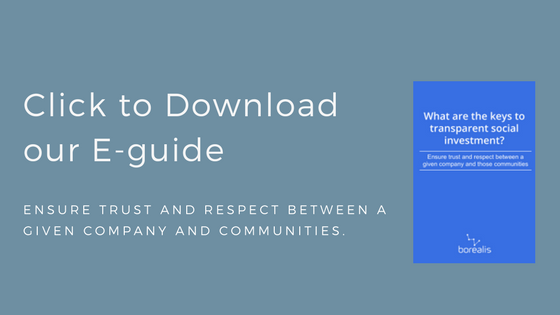Just in time for the PDAC International Convention, Deloitte has released its 2018 edition of Tracking the trends: The top 10 issues shaping mining in the year ahead. In this tenth anniversary report, Deloitte’s global mining professionals share their experiences to help identify strategies mining companies can follow to succeed this year.
Two chapters have caught our attention: The image of mining and Transforming stakeholder relationships.
Stakeholder engagement and social reputation are still key concerns.
Overall, mining organizations understand that not only negative perceptions can damage reputation and affect stock prices, but they can also develop into community protests and violence, and result in the loss of their social license to operate.
Indeed, Deloitte notices that several mining companies have begun adhering to voluntary sustainability standards (Taskforce for Climate-related Financial Disclosure, Global Reporting Initiative and Carbon Disclosure Project).
However, giving to the community and making some environmental gestures are not enough. Mining companies need to do it with more transparency and sustainability.
Furthermore, despite several attempts to regain social acceptability, the industry’s reputation remains tarnished in many countries due to perceptions that companies contribute to environmental damage and cause a negative impact on communities.
As a result, more than ever, mining companies need to maintain their efforts in order to gain stakeholders’ trust.
In that particular context, here are some key pointers that await the mining industry in 2018, according to Deloitte.
Social transparency: painting a picture of what numbers really mean
Transparency is now a prerequisite for trust. Mining organizations should precisely communicate the value they bring to society.
In fact, some of the social initiatives mining companies have undertaken in the past have failed to deliver on their intended results. They didn’t succeed in showing their value and sustainability.
Unfortunately, numbers alone don’t tell a compelling story.
Companies need to provide more concrete examples of how their investments and activities translate into measurable social outcomes such as a certain percentage increase in local employment or the number of workers successfully transitioned to new jobs following a mine closure.
Rather than an information dump, companies should share a concrete picture of what their numbers mean.
They also must be more proactive in reporting the impact they are making in local communities and countries, not only in terms of employment, but in terms of infrastructure investments, improved access to education, and the development of healthcare programs.
Instead of doing chequebook philanthropy donations that typically end once a mine site shuts down, some mining organizations have begun contributing a portion of their local revenues to foundations that empower community members to allocate funds based on local needs.
Yet, once again, it’s essential to notice all these gestures and clearly demonstrate how it benefits the community.
Embrace more collaborative modes of engagement with stakeholders
“If there’s one area where the industry needs to both collaborate and innovate, it’s around how it deals with communities and governments. It’s time for miners to change the lens on stakeholder management. Rather than approaching it as a cost of compliance, companies must determine how to make a concrete social impact that inures to the benefit of different stakeholder groups.”
Andrew Lane, Mining Leader, Deloitte Africa
We can see more and more decisive public stances around corporate social responsibility.
To take CSR to the next level, all organizations should understand that their real assets are their people.
Most large mining companies already work directly with governments and communities, but it’s still inconsistent.
They should meet regularly with key stakeholders before, during, and after a mine is operational. This is about more than good PR. It will provide companies with confidence in the face of criticism when they know they are actively respecting and incorporating the views of the communities they operate in.
Adopting collaborative approaches is a common success factor. Typically, it includes building a team that’s committed to working closely with stakeholders, engaging with them and starting negotiations as early as possible.
Deloitte warns us that transforming key stakeholder relationships will not be easy.
If mining companies truly hope to change for the better, they must do more than create stakeholder maps in the various markets where they operate to identify key decision makers and potential detractors.
They must also create a stronger sense of shared value with both local governments and local communities. This means moving beyond the unilateral actions companies typically adopt (such as donations and philanthropy, preferential hiring, and legal compliance) to embrace more collaborative modes of engagement.
Measure and report on sustainability
Reporting shows a real commitment to sustainability.
Deloitte notices that mining companies should invest in tools that can help them report consistently and with the same rigor used for financial disclosure. Software used may even end up providing valuable data that they can use in strategic decision–making.
Are you ready to take your social performance to the next level? Request a demo today and learn how Boréalis can help you to implement a transparent process while contributing to community benefits.






